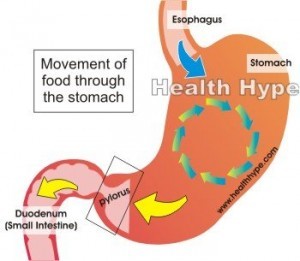Stomach Dumping Syndrome Causes, Symptoms, Treatment
Food that enters the stomach from the esophagus goes through both mechanical and chemical digestion. The strong stomach wall muscles crushes the food while the corrosive gastric acid and digestive enzymes breakdown the food further. Eventually small amounts of gastric chyme (broken down food mixed with gastric juices) empty out of the stomach into the duodenum. If this emptying happens too fast then it can lead to a host of problems.
What is dumping syndrome?
Dumping syndrome is a condition where food from the stomach is pushed out of the stomach too quickly. It is also known as rapid gastric emptying. The exit of food from the stomach is carefully controlled by a number of factors outlined in normal stomach emptying. This process plays an important part in overall digestion. If it is too fast (rapid gastric emptying) or too slow (delayed gastric emptying) the digestion is affected in several ways.
Since foods enters the small intestine too quickly and without being adequately digested, most of the symptoms of dumping syndrome are noticed shortly after eating and can last for several hours. Dumping syndrome is mainly seen in people who had surgery to remove either part of or the entire stomach, or in gastric bypass surgery for weight loss. It can be managed with dietary changes although medication and surgery may be needed for severe cases.
Causes of Dumping Syndrome
The stomach is a large muscular sac that can distend to comfortably accommodate about 1.5 to 2 liters (around 50 to 70 ounces) of food and fluid. The stomach outlet is a narrow tapered portion known as the pylorus and connects to the duodenum of the small intestine. It is the pylorus that regulates the outflow of food and fluid from the stomach. In this way food and fluid can be adequately digested and absorbed at a steady rate.
Essentially the stomach acts as reservoir for food and fluid, slowly releasing it into the small intestine over time. However, with surgery this is affected in several ways. The surgery may affect the body of the stomach known as the fundus thereby reducing its capacity or there may be impairment of the pylorus thereby affecting the regulated outflow of stomach contents. The sudden influx of food into the small intestine can lead to host of adverse effects.
The reasons for stomach surgery may vary like for weight loss (bariatric surgery) or cancer. The procedures where dumping syndrome may later occur includes:
- Gastrectomy
- Gastroenterostomy or gastrojejunostomy
- Gastric bypass surgery (Roux-en-Y operation)
- Esophagectomy
- Fundoplication
- Vagotomy
Gastric dumping syndrome is more likely to become apparent once a patient who underwent surgery returns to a normal diet. Certain foods are more likely to trigger symptoms, particularly refined foods. Gastric dumping syndrome is also more likely to occur in people with certain conditions like diabetes mellitus and Zollinger-Ellison syndrome. Drugs like metoclopramide are used to speed up gastric emptying but normal emptying returns once the drug is discontinued.
Signs and Symptoms
The symptoms of dumping syndrome can be separated into early and late form. In the early form, symptoms usually appear within 10 to 30 minutes after eating although some symptoms may become apparent almost an hour after the meal. In the late form, symptoms appear between 1 to 3 hours after eating. While both forms can affect a person, some people may only have one form like late dumping syndrome and not the other.
Early Dumping Syndrome
The body’s response to the sudden inflow of food into the small intestine gives rise to digestive and cardiovascular symptoms. The latter occurs due to hormonal responses as well as the sudden flow of blood to the intestines.. These symptoms may include:
- Nausea
- Bloating
- Abdominal pain
- Intestinal cramps
- Loud stomach noises
- Diarrhea (arises after the other symptoms)
- Flushing (face)
- Rapid heart rate
- Palpitations
- Dizziness and sometimes fainting
Late Dumping Syndrome
The symptoms of late dumping syndrome arise from the body’s hormonal response to the sudden entry of large amounts of food in the small intestine and rapid absorption of nutrients. A surge in insulin causes reactive hypoglycemia. These symptoms include:
- Hunger
- Palpitations
- Sweating
- Tremors
- Fatigue
- Confusion
- Agitation
- Fainting
Complications
Severe dumping syndrome can lead to a host of complications.
- Severe weight loss as the body cannot absorb sufficient nutrition.
- Malnutrition due to the impairment in digestion and absorption.
- Chronic diarrhea which has physiological and social effects.
- Persistent fatigue due to insufficient nutrients.
Diet for Dumping Syndrome
A few simple dietary changes can be useful in managing dumping syndrome without any medical intervention. These dietary habits need to be continued lifelong.
- Eat smaller meals more frequently. Rather opt for 5 to 6 small meals during the course of the day rather 3 large meals.
- Chew thoroughly. By chewing thoroughly the food is broken down into smaller pieces and this helps with digestion.
- Limit carbohydrates. Refined sugar in particular is a problem but even natural sugars like lactose should be limited.
- Increase dietary fiber. Fiber helps to slow down the absorption of carbohydrates. High fiber foods should be included in the diet but if necessary, fiber supplements may be used.
- Lie flat after eating. Although this is not usually advisable, with dumping syndrome it can help slow down digestion by counteracting the pull of gravity.
It is always advisable to consult with a registered dietitian for an individualized eating plan.
Treatment of Dumping Syndrome
Medical and surgical treatment is only considered when the symptoms of dumping syndrome are severe and not responding to dietary management. Apart from drugs and surgery helping with the management of symptoms, treatment may also assist in delaying or preventing complications in severe cases.
Drugs that may be used includes:
- Octreotide is an anti-secretory agent that affects the secretion of a number of hormones. It works by slowing down gastrointestinal motility and helps to delay gastric emptying.
- Acarbose is a hypoglycemic agent helps to lower blood glucose levels. It works by delaying the digestion of carbohydrates.
Surgery is only considered when diet and medication fail to yield satisfactory results. It may involve a number of different procedures such as reconstructive surgery of the pylorus. A gastric bypass may be reversed in patients with severe dumping syndrome.
References:







